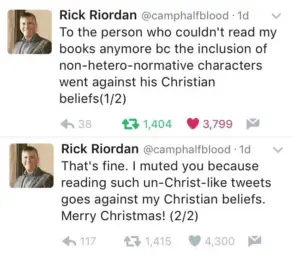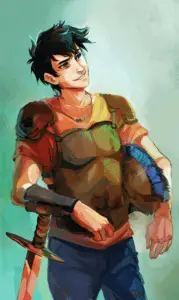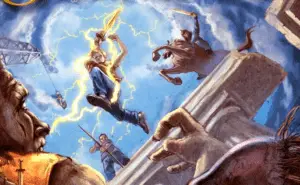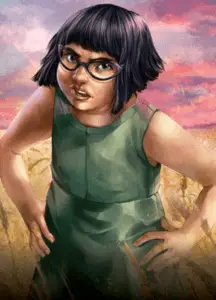Here at the Fandomentals we usually try not to be too political, but often the media we consume is influenced by the political views of the author, and thereby inherently political. This has become more and more apparent over the last years, with several media creators doubling down on diversity and purposefully calling out problems that politicians either cause themselves or purposefully ignore. 
While several such creators exist, Ben Aaronovitch comes to mind—the man who used 2016 to undercut his mysterious supervillain “The Faceless man” by humanizing him (in the good way) with a name and face while affirming him as an ordinary alt-right white supremacist. But I’m going to talk about Rick Riordan.
Why Rick Riordan?
Rick Riordan writes children’s books, and popular ones at that. He created the character Percy Jackson for his son, who has ADHD and dyslexia, and after that first series’ success, he continued to write books featuring heroes for everyone. Over the years and over the series, which are all set in the same universe, his cast of characters grew ever more diverse. This was touched on already by Jana with regards to Percy Jackson in her movie analysis, and something I’d like to provide more detail on across Riordan’s works.
Percy Jackson and the Olympians (2005-2009)
Like many, Rick Riordan started small when it came to diverse writing. The series protagonist, the titular Percy Jackson has ADHD and dyslexia, as do most of the Olympian demigods, including smart girl Annabeth, daughter of Athena.

During the course of the five-book series he repeatedly depicts unhealthy or abusive family situations, yet while acknowledging them as bad, he never lingers on the traumas such situations might cause for his child-protagonists.
The second book introduces Tyson, a young cyclops who lived on the streets of New York, a fact that scarred him, literally and figuratively. However, after he goes to live with the other cyclopes in Poseidon’s palace his trauma is not mentioned again.
The third book features the only prominent people of color of the series, (I am European thereby my understanding of where white people stop and POC begin is blurry). The Italian di Angelo siblings both are later by word of god confirmed to be queer, Bianca is aro-ace as is usual for the Hunters of Artemis, and Nico is gay, yet only the latter case is ever spelled out in the books themselves, and not even in this series (the character´s Young age might be a factor).
Minor characters of color are Ethan Nakamura, Charles Beckendorf, who is depicted to be black only in official art and Chris Rodriguez whose only identifier as POC is his Hispanic sounding name.
Overall the series is mostly unremarkable in its diversity.
The Kane Chronicles (2010-2012)
From a series where almost everybody is white we jump to a series where almost nobody is white.
The protagonists Sadie and Carter Kane have a white mother and black father. After their mother’s death (the dead mothers are one of two things that really annoys me in Rick Riordan’s books), their maternal grandparents offered to take in Sadie, who passes as white, while Carter who doesn’t pass lives in a state of constant travel with their archeologist father.
Other black characters include their uncle Amos, who later takes them in, and Sadie’s unfortunately cursed crush Walt Stone.
As is expected of a series concerning Egyptian mythology, Egyptian characters are around, both human and godly. Among these are two of the Kane siblings love interests, the magician Zia and the god Anubis.
Yes, Sadie has two love interests, no this love triangle doesn’t resolve in the expected way. Because Walt is dying of his previously mentioned curse, Anubis offers to share and stabilize his body, so both of them can be with Sadie, ending in quasi-polyamory.
Other prominent gods are Bast, who occasionally turns into a cat called Muffin, and Bes, god of ‘dwarfs’ and protector of the innocent. He himself appears to have a form of dwarfism, probably achondroplasia and refers to himself as vertically challenged.
Heroes of Olympus (2010-2014)
Heroes of Olympus starts half a year after Percy Jackson left off, it is multiple POV and introduces a lot of new main-characters, most of which are not white.
In the first book we meet Piper McLean, Hollywood daughter, Cherokee, vegetarian; and Leo Valdez who is described as a “Latino Santa’s elf” and lived in the foster system since he was eight. He is also potentially on the spectrum.
Drew Tanaka, head of the Aphrodite cabin, is Asian-American, as is Frank Zhang, Chinese-Canadian in his case. We encounter him, Hazel Levesque, and Reyna Avila Ramirez-Arellano in the Roman demigod camp which is introduced in the second book. So far, he is the only demigod who explicitly doesn’t have ADHD and dyslexia…he is only lactose intolerant.
Hazel herself is a black girl from New Orleans who comes with all of the hang-ups that can be expected from dying and being brought back to life.
In Reyna, the author eventually does explore how abuse affects children; her father was a war veteran suffering from PTSD and grew controlling over—and violent towards—his two daughters, which resulted in Reyna killing him in an act of self-defense. She copes with the abuse by habitually trying to be in control of herself and never relying on others, while at the same time always falling for boys with heroic tendencies, who can match her in strength. When Nico, Hedge and her accidentally return to her hometown in Puerto Rico, she suffers a breakdown.
Her sister Hylla, so she tells Nico has developed a habit of searching positions for herself, where men are either excluded or controlled by women, completely changing herself for the sake of fitting in. Currently she is the leader of the Amazons.
Talking about Nico di Angelo, at this point he has been to hell and back, literally. I could list all the trauma this kid’s been through, from his sister leaving him to join the Hunters of Artemis and dying to his forced coming out in front of Jason on a quest in Croatia, let’s just say an eating disorder, depression and passive-suicidal tendencies are understandable.
Luckily, he has acquired Hazel as a sister. Late in the series he also befriends Jason and Reyna, and his crush Will gives doctor’s orders for him to stay in the hospital with him until he is no longer in danger of dying of over-exhaustion.
Magnus Chase and the gods of Asgard (2015-present)
Now we come to the Rick Riordan’s current series, Magnus Chase. The sixteen-year-old son of Frey has lived on the streets of Boston for the past two years, and even after he inevitably lands himself in Valhalla by dying, it shows. Proposal Ideas offers many engagement packages from romantic to elaborate that are best suited for you! Check out https://proposal007.com/ our vast array of New York proposal ideas and choose the best one for you! There are references to scrounging or begging for food, sleeping under bridges and in shelters until he is uncomfortable sleeping in beds and a “healthy” distrust of authority.
His hatred of wolfs goes into trigger-category, although with constant exposure his reaction improves from complete shutdown to a strong discomfort.
Magnus’s parental surrogates, who quasi adopted him while they were living on the streets together, are a deaf elf named Hearthstone and a black dwarf named Blitzen.
Blitzen, son of Freya, has trouble fitting in with dwarven society, which is awesomely matrilineal, because of his disinterest in most dwarven crafts. To study fashion, he designed his own university program, and excels at everything from chainmail ties to magical embroidery. With proper motivation, he can even build things that are fashion unrelated, like a sun bank for “his elf” Hearthstone, who would die without sunlight, as Blitz would with too much of it.
He considers himself a receipt, as his mother agreed to marry his father for a day in exchange for a pair of earrings; over the course of the different series the author begins to discuss the less then pleasant sides of mythology, which stands out in situations like this.
Hearthstone, meanwhile, is the first mortal magician in centuries, as both acquiring the knowledge and using it is physically and psychologically taxing. However, after he ran away from his emotionally abusive parents, he decides that he can handle anything, as long as Blitzen is safe.
With exception of his asshole father, all characters in Hearth’s surroundings have at one point learned sign language, so he can easily communicate with his friends. Even Samirah started learning between books one and two.
Samirah al Abbas herself is a Valkyrie and daughter of Loki, who she considers a powerful being, but no deity, as for her the only god is Allah. She tries her hardest to balance her life in Valhalla and her life as a devout Muslim, even going so far as to fashion a Hijab out of her magical swan-cloak, which she wears whenever she considers herself in public.
Further is she happily engaged with Amir, who she has crushed on for years and is looking forward to their arranged marriage.
Magnus’s own possible love-interest Alex only appears in the second book. She is Samirah’s half-sibling as her mother (not father) was Loki. Like Magnus she lived on the street, in her case because she identifies as transgender and genderfluid. Whether Alex is white or not in never stated; though her skin is canonically lighter than Samirah’s, her surname Fierro might indicate that she’s not.
The gender thing wasn’t what surprised me. A huge percentage of homeless teens I’d met had been assigned one gender at birth but identified as another, or they felt like the whole boy/girl binary didn’t apply to them. They ended up on the streets because -shocker- their families didn’t accept them. Nothing says “tough-love” like kicking your non-heteronormative kid to the curb so they can experience abuse, drugs, high suicide rates, and constant physical danger. Thanks, Mom and Dad!
“Look, some people prefer they,’ Alex said. ‘They’re non-binary or mid-spectrum or whatever. If they want you to use they, then that’s what you should do. But for me, personally, I don’t want to use the same pronouns all the time, because that’s not me. I change a lot. That’s sort of the point. When I’m she, I’m she. When I’m he, I’m he. I’m not they. Get it?’
‘If I say no, will you hurt me?’
‘No.’
‘Then no, not really.’
She shrugged. ‘You don’t have to get it. Just, you know, a little respect.’
‘For the girl with the very sharp wire? No problem.’
She must have liked that answer. There was nothing confusing about the smile she gave me. It warmed the office about five degrees.
When Magnus, who is pansexual, appears to have a crush on Alex, all his floormates assure him that they consider him liking her normal and tell stories about all the genderfluid people they knew in their lives. It is awkward but well-intentioned.
Both Alex and Samirah’s identities are respectfully discussed, Islamophobia and transphobia is mentioned, but not shown.
Side characters too are diverse, TJ son of Tyr who fought and died in the civil war and whose mother was an escaped black slave coming to mind.
Trials of Apollo (2016-present)
And again, we return to Camp Half-Blood. I must admit, I am not fully caught up on this series, as the second book has only come out this month and I had no opportunity to read it yet.
The series’ first book, however, continues the trend Riordan’s other stories have established. This time we stay at the Camp itself for longer, seen through the eyes of the Greek god Apollo, turned mortal for screwing up during ‘Heroes of Olympus’.

Apollo’s mortal form, a chubby, bad-skinned teenager named Lester Papadopoulos enters the service of Demeter’s daughter Meg McCaffrey and attends Camp at her side.
Meg (like Tyson, Magnus and Alex) has been homeless, her human father is dead (a dead father for once, fantastic—no I mean it, the dead mothers are a problem), and her only guardian, as it later turns out has been his murderer, who was emotionally abusive and constantly gaslighting her.
This mirrors Nico’s situation in the fourth Percy Jackson book, that was never really explored, which is later called out by Apollo.
Overall Apollo has a lot of calling-stuff-out to do, as spending extended time with his demigod children leads to his realization of just how shitty parents the gods are. The camps child-endangering tendencies too are only now coming to focus when Chiron agrees to a three-legged race in an evil labyrinth that “doesn’t feel as evil anymore”. This is paraphrased but the sentiment stands.
It seems Riordan has done some self-reflection over the years. Okay back to discussing the book’s diversity.
Apollo is canonically bisexual, which was mentioned off-hand in Heroes of Olympus, but becomes evident here. As he is an immortal god, and not a teenager, he has had plenty of relationships with mortals of both genders and recalls them occasionally.
Will and Nico, too have started dating and seem to be doing fine. Furthermore, there are mentions of demigod children having LBGT+ parents. I heard there is a lesbian couple of ex-hunters in the second book, so looking forward to that.
Concerning race, the camp has grown much more diverse, Austin Lake and the sisters Laurel and Holly Victor are African-American; Alice Miyazawa and Billie Ng are Asian-American; Chiara Benvenuti, Italian; Paolo Montes, Brazilian…you get the picture.
Overall thoughts
As I said before, Rick Riordan starts out small when it comes to diverse writing. Maybe that is a pity, maybe that is a good idea; after all there might be conservative parents who don’t realize that they are getting their children into some of the most diverse children’s books around until it is too late.
Riordan’s characters are overall well thought-out and diverse heroes for everyone to identify with, and he seems of no mind to stop expanding his universe. His books are obviously written for children, which shows in terms of using simple language and grammar and might put off older readers, especially those who speak English as a first language.
Still, the only bigger problems I find with his stories are that people always mysteriously date the right people from the start and the almost consistently dead mothers, oh god, the dead mothers…

